Walgreens Will No Longer Let You Do This, Effective Immediately
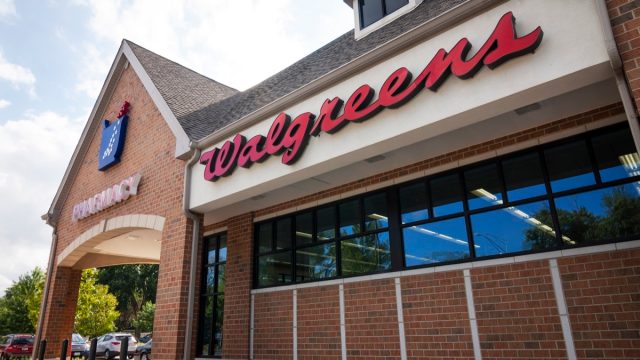
Whether it was for a last-minute snack or a much-needed prescription, there’s a good chance you’ve been to a Walgreens store recently. The drug store chain feels omnipresent for a reason: About 78 percent of us live within five miles of one of the company’s nearly 9,000 U.S. locations. But whether you’re a frequent Walgreens shopper or you just stop in every now and then, you’ll want to be aware of a new policy change that could affect your next shopping trip. Read on to find out what Walgreens will no longer let you do, effective immediately.
RELATED: Walgreens Shoppers Are Outraged About This Major Change to Stores.
Walgreens is now limiting the amount of baby formula shoppers can buy.
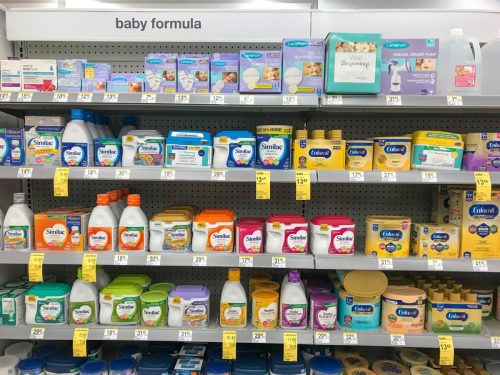
If you’re looking to stock up on baby formula, you’ll have to find it somewhere other than Walgreens. The drug store chain has started limiting how much of this product shoppers can buy at its stores at one time, USA Today reported on April 9. Walgreens is now only allowing customers to buy three infant and toddler formula products per each transaction “to help improve inventory,” the company said.
“Due to increased demand and various supplier issues, infant and toddler formulas are seeing constraint across the country,” Walgreens said in a statement to the newspaper.
There is a significant baby formula shortage happening right now.
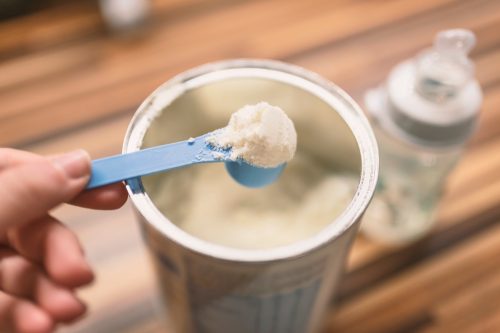
Walgreens’ purchase limit has come at a time in which baby formula is experiencing a significant shortage. Datasembly, a research firm based in Virginia, recently analyzed supplies at more than 11,000 stores in the U.S. and found that around 30 percent of popular baby formula brands may be sold out at retailers across the country. And despite shortages in general becoming more commonplace since the onset of the pandemic, Datasembly CEO Ben Reich told USA Today that this outage level is higher than for other products.
“Inflation, supply chain shortages, and product recalls have brought an unprecedented amount of volatility to the category, and we expect to continue to see baby formula as one of the most affected categories in the market,” Reich explained.
RELATED: For more retail news delivered straight to your inbox, sign up for our daily newsletter.
The shortage was exacerbated by a major baby formula recall earlier this year.
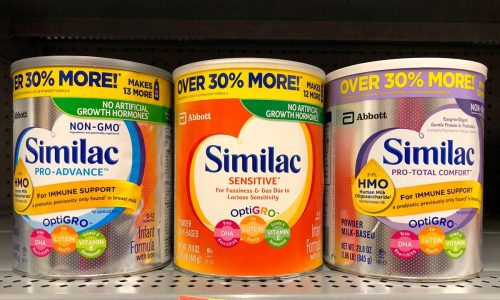
Baby formula has been experiencing a shortage for some time now, but it’s ramped up recently. According to Datasembly, 2 to 8 percent of baby formula products were out of stock over the first seven months of 2021, per CBS News. That number rose to 11 percent in Nov. 2021 before sharply rising to 29 percent for the week of March 13.
“We’ve been tracking it over time and it’s going up dramatically. We see this category is being affected by economic conditions more dramatically than others,” Reich told CBS.
A large factor in this increase was a major recall earlier this year from Abbott Nutrition, which produces several popular brands of baby formula. On Feb. 17, the company announced that it had issued a voluntary recall for certain batches of Similac, Alimentum, and EleCare formulas that were manufactured at one of its plant in Sturgis, Michigan. The recall was brought on by investigations from the U.S. Food and Drug Administration (FDA), and the Centers for Disease Control and Prevention (CDC) over consumer complaints and at least four reports of infant illnesses linked to products from this facility.
Other retailers are also struggling to keep baby formula in stock.
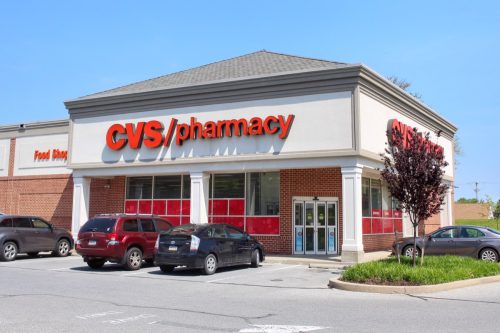
Walgreens isn’t the only retailer having issues with baby formula inventory. “We’ve noticed it being difficult to find maybe a couple months ago—two, three months ago—and then just recently we can’t find it. We’ve tried all the local Targets. We checked Costco, Costco online, Walgreens, Long’s. Can’t find it anywhere,” San Francisco resident Irene Anhoeck told CBS News earlier this year.
There have not yet been any reports about other retailers imposing a purchase limit on baby formula, but some have spoken out about the shortage. “Product supply challenges are currently impacting most of the retail industry,” CVS Health said in a statement to USA Today. “We’re continuing to work with our national brand baby formula vendors to address this issue and we regret any inconvenience that our customers may be experiencing.”
During an April 8 Instagram Live discussion, Brian Dittmeier, the senior director of public policy for the National Women, Infants, and Children (WIC) Association, said that baby formula manufacturers “are tuned into” this issue, adding that the organization is under the “understanding that across the board, folks are ramping up production.”
“Now, it’s not like flipping a switch,” Dittmeier said. “We will probably continue to see shortages in the next couple of weeks. But our hope is that as production ramps up, that later this spring it should be easier for families across the country.”
RELATED: Publix Will No Longer Let Shoppers Do This, Starting June 1.